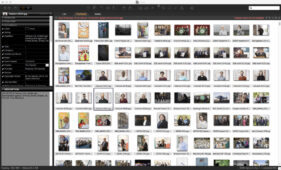Any freelance will tell you that there is a great deal of admin involved in keeping things running smoothly. As a photographer one of the more critical elements of my admin, apart from making sure I keep my accounting up to date, is to ensure my photo archive is accessible.
By this I mean that if I need to look up an assignment I shot a decade ago, this shouldn’t be an exercise in rummaging through a suitcase full of random CDs, DVDs and hard drives hoping to find the one I need (and keeping fingers crossed that it hasn’t become damaged and un-readable).
Since I went digital in 2000 I’ve kept a catalogue of every assignment I’ve ever undertaken. It’s a simple piece of software which I use to record each job. It pulls keywords from the captions I’ve written to the image files, so when I go to search I just need a place or person’s name or something relevant to the assignment and the catalogue will return thumbnails of any pictures with matching keywords.
When I click on a thumbnail the software tells me which disk or drive that image (and therefore the rest of the job) is stored on. Since all my storage is kept in strict order it’s easy to find any job pretty fast.
The software, called Media Pro, has changed little over the years; I can’t remember who developed it because it has been owned by various companies including Microsoft. It’s now owned by a company called Phase One and I have to say it’s been brilliant.
The beauty of its simplicity is that even when Phase One took it over I didn’t have to start all over again, re-importing every job from the last 15 years. I just had to buy a new licence to use Media Pro, and the software automatically recognised my catalogue file.
Now you might be wondering why I’d bother to bore you with all this back-story, but the simple fact is that clients occasionally need me to relocate a job from a few years ago (and they’re often on a deadline when they ask me to do this) and my ability to reach back, find older work and resupply the images as needed is a valuable part of my service.
Of course this facility requires admin time, reliable storage and very occasionally a little extra cost in paying for a new licence, but I take these factors into consideration when setting my fees.
When you’re looking to hire a photographer it’s well worth checking what their storage and archive policies are; how long do they store images for? Do they have a system for retrieving long-forgotten jobs at short notice? Is their archive duplicated and held in different locations to protect against loss through flood, fire or theft?
No one can 100% guarantee to keep everything for ever, but I’ve kept my system safe and accessible for over 15 years now. I wonder how many other photographers can say that?

